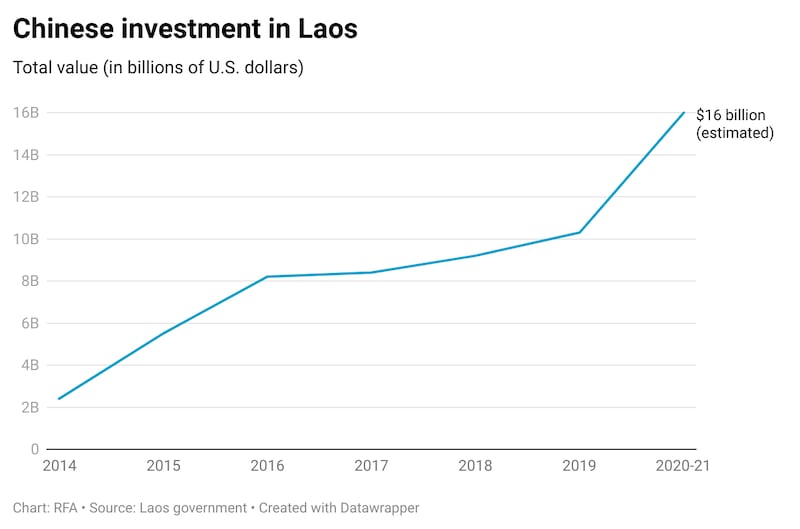China’s investment in Laos has climbed since 1989 to a cumulative $16 billion, but little of this money has benefited ordinary citizens, while the negative impact from Chinese development projects isn’t being counted accurately, Lao sources say.
Sonexay Siphandone—Minister of Investment and Planning—told a meeting with Chinese investors last month that “Chinese investment takes top place on the list in Laos, with over 800 small, medium, and large-scale projects at a total value of $16 billion.”
Foreign investment totals are added to calculations of the country’s GDP, which was $19 billion in 2020, “but mega projects such as hydropower dams and other infrastructure schemes don’t distribute their benefits equally to local people,” a Lao researcher told RFA, speaking on condition of anonymity for reasons of security.
“It’s unacceptable that we should talk about the value of investments when these aren’t shared to support the people’s interests.”
For example, a high-speed Lao-China railway under construction in Laos at a projected cost of $6 billion has benefited more Chinese than Lao workers, the researcher said.
“The majority of workers have been imported from China, while unskilled Lao workers have been recruited at much lower salaries,” he said.
In the agricultural sector, the overuse of herbicides and pesticides by Chinese-invested banana plantations in northern Laos have harmed the environment and health of people living in surrounding areas, he added.
“This is not sustainable development, because the impacted communities are not allowed full participation in the [management of the] farms. In theory, these are win-win arrangements, but in practice things are absolutely different,” he said.
Chinese hydropower and mining projects, the Lao-China railway, and an expressway project in the Lao capital Vientiane have also displaced thousands of families, many of whom lost their farms, incomes, and ways of life in the process.
“These were huge impacts, and it will take a long time now for things to be returned to their normal condition,” the researcher said.
“I travel in the north and I see banana plantations that have been abandoned. The Chinese owners went back to China, and the Lao workers have not been paid their salaries,” he said.

'A huge gap'
Also speaking to RFA, a Lao legal advisor who asked not to be named said, “Lao workers on Chinese projects are paid smaller salaries, while Chinese businessmen buy hotels, guesthouses, and restaurants in places that the Lao-China railway runs through.”
There is a huge gap between the value of Chinese investments in Laos and the negative impacts they create, the legal advisor said, adding, “No one can express concerns about these things in public out of fear for their safety.”
“It makes no sense to just tell people the high value of Chinese investments,” agreed a Lao businessman, also speaking on condition of anonymity.
“The impact of Chinese investment projects is that the environment is ruined and that local people lose their ways to make a living, and no one reports the estimated costs of this,” he said.
Requests for comment by senior officials of Laos’ Ministry of Investment and Planning received no response.
A lower-level ministry official, however, said that Laos and China, countries with similar one-party political systems, are working to strengthen Laos’ economy by building a “community of common destiny” – a phrase from a 2017 speech by Chinese President Xi Jinping.
Laos is now drowning in debt with at least $400 million due in loans this year that can’t be repaid, with cash flows crippled in the country because of a shutdown of the economy due to COVID-19 and another $1 billion coming due each year from 2022-2025, experts said in earlier reports.
State officials and Lao researchers say they now see no way the one-party communist state can meet the debts it owes foreign lenders, mostly in China but also in Thailand and Vietnam, amid the global pandemic.
China is Laos’ largest foreign investor and aid provider, and its second-largest trade partner after Thailand.
Reported and translated by Ounkeo Souksavanh for RFA’s Lao Service. Written in English by Richard Finney.
